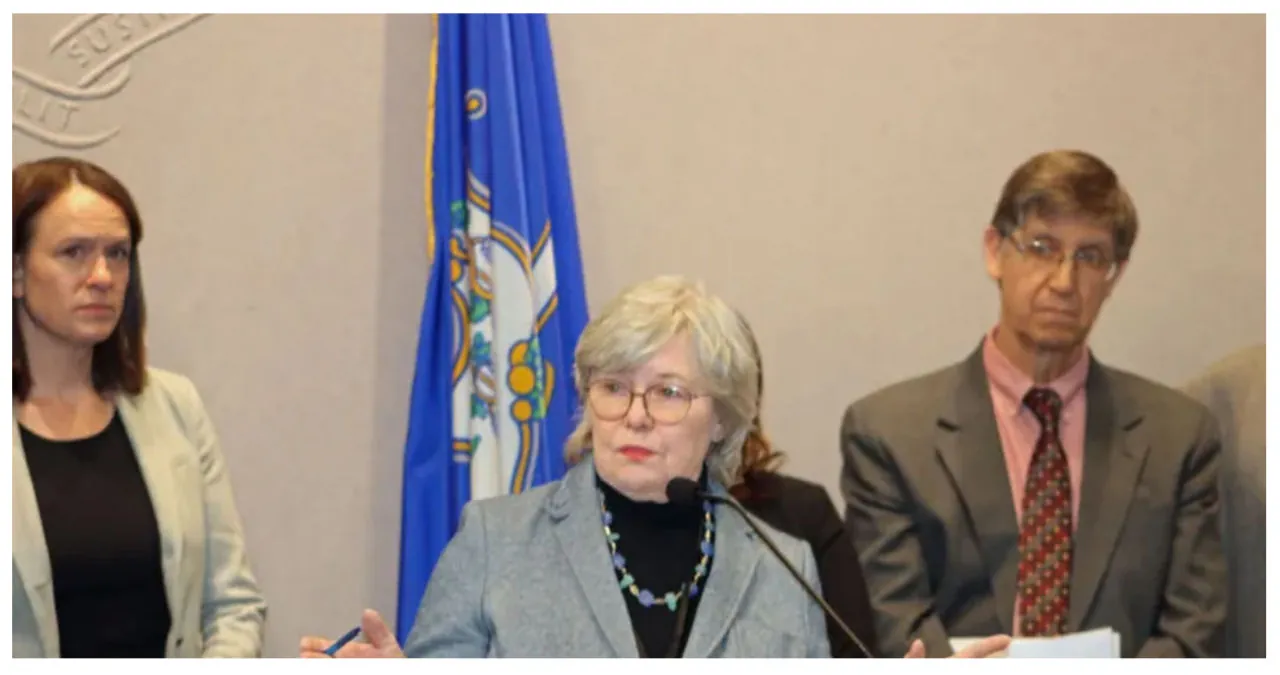In May 2018, Mark Jansen met with lawyer Kenneth Krayeske, fully aware of his impending death.
Jansen, who was serving his sentence at the MacDougall-Walker Correctional Institution, informed a medical professional about his hearing loss, as stated in court documents. Consequently, he was relocated to the Willard Correctional Center in November 2017. During his time there, Jansen had multiple interactions with nurses and doctors concerning various health concerns.
According to the complaint filed by Krayeske on behalf of his daughter, Heidi Donovan, Jansen repeatedly informed nurses and Dr. Michael Clements, a physician, about his hearing loss, dizziness, and a foul smell in his nasal passages. However, it was not until December 12 that he finally received a CT scan, which revealed the presence of a large, benign tumor called an acoustic neuroma in his brain. Jansen sought the assistance of Krayeske in February 2018.
Krayeske recalled a heartbreaking moment in his office when Jansen, teary-eyed, came to sign a letter of engagement. Jansen had been granted early release in March to seek treatment for his tumor. In the months that followed, he underwent two surgeries in June and August to have the tumor removed.
Mark Jansen passed away on September 5, 2018, due to complications arising from the surgery he had undergone. This outcome was anticipated by Mark himself.
According to Krayeske, Dr. Clements was aware that the delay in receiving treatment for his tumor from the Department of Correction would ultimately result in his death. Throughout his treatment, Dr. Clements did not report his hearing loss and instead focused on addressing his other symptoms without investigating the hearing loss further.
The lawsuit filed by Jansen’s daughter claims that Dr. Clements and three registered nurses showed deliberate indifference to her father’s medical needs, which violates the Eighth Amendment. While the three nurses have been excluded from the lawsuit, a recent ruling by a judge allows the lawsuit to proceed against Dr. Clements.
This marks Krayeske’s third lawsuit against the Department of Correction and its medical staff since June 2023. He has also served as legal representation for the estate of Anthony Coward, an inmate who tragically passed away while incarcerated at the Garner Correctional Facility in Norwich. Coward had submitted multiple medical request forms, expressing concerns about dizziness, lightheadedness, and severe chest pain that hindered his ability to sleep. Despite being evaluated by nurses, Coward never received the opportunity to see a doctor. He ultimately succumbed to an “acute myocardial infarction due to atherosclerotic and hypertensive cardiovascular disease” on June 13, 2022.
Coward’s cause of death was a heart attack.
The Department of Correction and the Attorney General’s office have chosen not to provide any comment regarding the pending litigation.
According to the Yale Law Clinic, more than 200 individuals lost their lives in Connecticut prisons from 2019 to 2021. It is important to note that the deaths of Jansen and Coward are not accounted for in this statistic. Krayeske reveals that the medical staff’s handling of Coward’s situation was so severe that the state promptly settled the case for a sum of approximately $800,000. He anticipates that his remaining two cases will result in comparable settlements if agreements are reached.
“How many nurses and doctors could we afford with $2.4 million?” he pondered. “Rather than compensating individuals after their demise, wouldn’t it be more sensible to address the flaws within our healthcare system?”
Krayeske is currently in the running for the position of Correction Department ombudsman, a role that would serve as a vigilant overseer of the agency.
In 1973, a position called the ombudsman was established to investigate complaints and assess the conditions within state prisons. Unfortunately, this position was eliminated in 2010 as a way to reduce costs. However, there is good news as the position has been reinstated with a budget of $400,000 for the next two years.
Advocates and lawmakers have expressed their frustration over what they perceive as a delay by Governor Lamont in filling the position. Governor Lamont is expected to make the appointment by Sunday.
Krayeske, an advisory panel’s preferred candidate, has been forwarded to Lamont. Following Krayeske are Barbara Fair, a veteran activist from the advocacy group Stop Solitary CT, and Hilary Carpenter, an attorney and assistant public defender. The governor has the option to choose from any of the three finalists.
“I believe that enacting meaningful change and shaping policies from within the system as an ombudsman is more effective than achieving victories from the outside,” he expressed. “While I certainly aspire to hold this position, it is important to acknowledge that any individual appointed as the ombudsman would undoubtedly bring about positive improvements.”
According to the Office of Policy Management, the state’s prison population reached a record high of 19,413 inmates in 2008. This increase occurred when former Gov. M. Jodi Rell suspended parole following the Petit murders committed by two parolees. However, the number of inmates has since decreased to 9,945 in 2020 and currently stands at 10,510 as of last month, as reported by state data.
Read More:
- Alabama lawmaker pushes for felony classification of fake abductions following Carlee Russell hoax.
- Seizing Political Power: Young Native American Voters in Arizona

